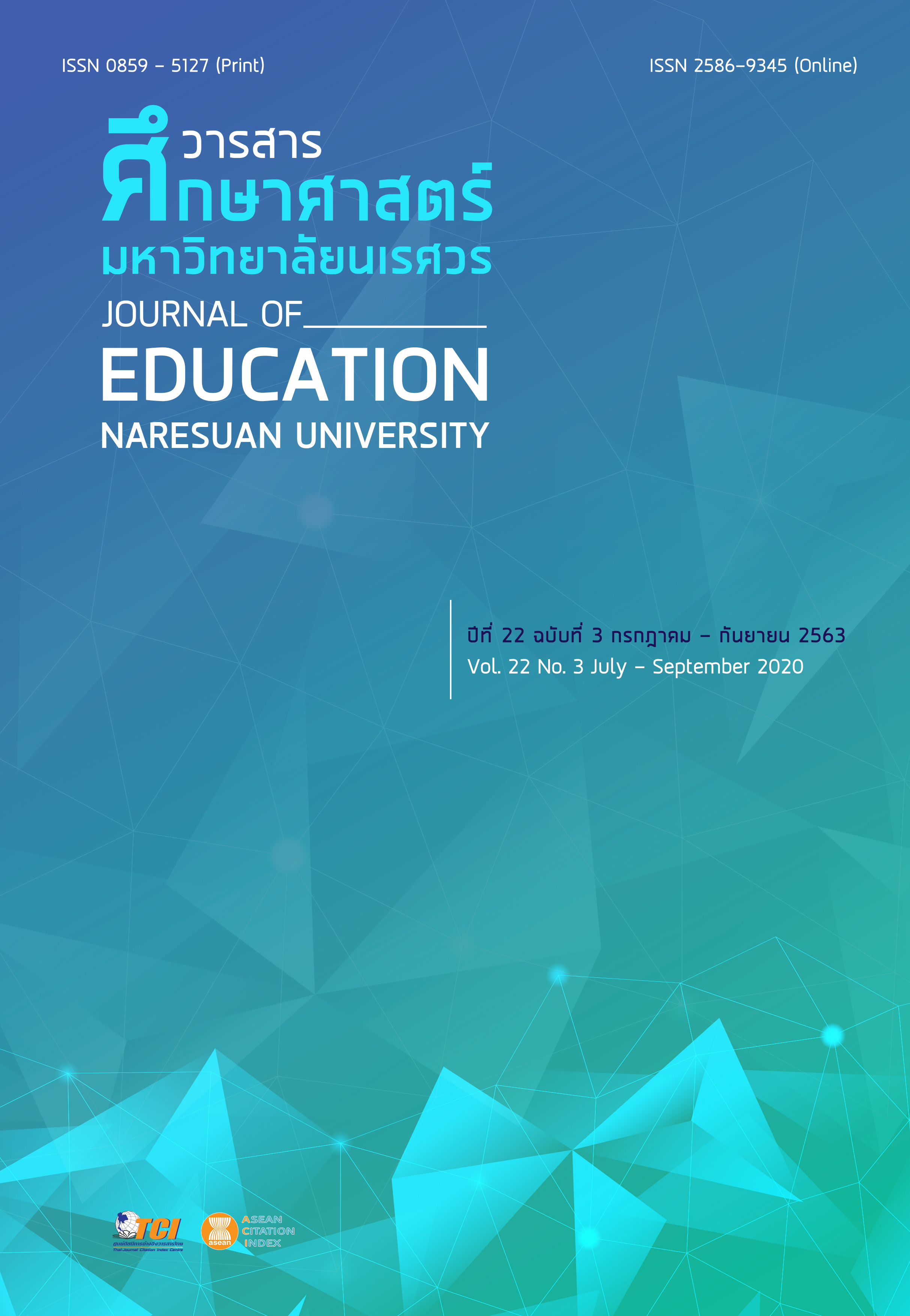DEVELOPING SCIENTIFIC LITERACY IN THE TOPIC OF ACID-BASE USING CONTEXT-BASED LEARNING MANAGEMENT FOR GRADE 11TH STUDENTS การพัฒนาการรู้วิทยาศาสตร์ เรื่อง กรด-เบส ด้วยการจัดการเรียนรู้ที่ใช้บริบทเป็นฐาน สำหรับนักเรียนชั้นมัธยมศึกษาปีที่ 5
Main Article Content
Abstract
This research aimed to study the possibility of learning management using context-based learning for developing scientific literacy and study the effect of learning management using context-based learning for developing scientific literacy in acid-base topic. The participants were 37 students of grade 11th. The research tools comprised of the three learning plans of context-based learning, the reflective learning management form, the students’ work sheets, and the scientific literacy test. Data analysis by content analysis, give a score and levels of scientific literacy from 1-6 based on PISA 2015 framework. Data creditability by triangulation method. The result of this research indicated that the context-based learning management for developing scientific literacy consist of 4 steps included: 1) Phase of presentation with context, teacher presents the context. 2) Phase of curiosity and planning, teacher use questions to stimulate students to identify and select the problems for design method. 3) Phase of elaborating, teacher stimulate students to do an experiment, analyze the data and discuss with the results. 4) Phase of deepening and connecting, teacher presents another context. encourage students to practice and apply the knowledge they have learned in the context Furthermore, the result indicated that the student had post-test of scientific literacy level equal 4 higher than the pre-test at level 1b.
Article Details
The owner of the article does not copy or violate any of its copyright. If any copyright infringement occurs or prosecution, in any case, the Editorial Board is not involved in all the rights to the owner of the article to be performed.
References
Bennett, J., & Lubben, F. (2006). Context-based Chemistry: The salters approach. International Journal of Science Education, 28(9), 999-1015. DOI: 10.1080/09500690600702496
Broman, K., & Parchmann, I. (2014). Students' application of chemical concepts when solving chemistry problems in different contexts. Chemistry Education Research and Practice, 15(4), 516-529.
De Jong. (2006). Context-based chemical education: How to improve it. Chemical Education International, 8(1), 1-7.
De Jong. (2014). Handbook of research on science education chapter: The many faces of high school chemistry. New York: Routledge.
Gedsripri, A., & Wattanathorn, A. (2010). New relationship of science and technology literacy and social sustainable development. Journal of Education Naresuan University, 12(2), 183-190. [in Thai]
Kamta, Y. (2014). The development of seventh grade student’s conception of atmosphere and applications in everyday daily life through context-based learning (Master thesis). Bangkok: Kasetsart University. [in Thai]
Khuetong, T. (2010). Learning Science in Context. IPST Magazine, 38(166), 56-58. [in Thai]
Kijkuakul, S. (2014). Scientific literacy learning management for teacher in 21st century. Phetchabun: Juldis Printing. [in Thai]
Manager Online. (2015). "Skin peeling" dangerous to death. Retrieved May 5, 2018, from https://manager.co.th/Home/ViewNews.aspx?NewsID=9580000106806 [in Thai]
Matichon online. (2018). Drinking Water Clip - Misconceptions Why use the wrong test. Retrieved May 5, 2018, from https://www.matichon.co.th/news-monitor/news_936401 [in Thai]
Namsri, C., Ruannakarn, P., & Inyai, C. (2014). Influence of learners’ performance on science learning ability of grade eleven students. Research Methodology and Cognitive Science, 11(2), 53-62. [in Thai]
Organization for Economic Cooperation and Development (OECD). (2017). PISA 2015 assessment and analytical framework: Science, reading, mathematic, financial literacy and collaborative problem solving. Paris: OECD Publishing.
Pramchoo, J. (2010). The effect of using context-based learning activities on grade-11 student learning achievement in chemistry. Srinakharinwirot Research and Development (Journal of Humanities and Social Sciences), 2(1), 33-39. [in Thai]
Preechapongmit, A. (2014). Effects of context-based learning on conceptual understanding and achievement motivation in chemistry of upper secondary students (Master thesis). Chiang Mai: Chiang Mai University). [in Thai]
Suksanchananun, C. (2012). The development of junior high school students’ conception and conceptual transferability of heat by contextual learning (Master thesis). Bangkok: Kasetsart University. [in Thai]
Suriyo, A. (2015). The development of tenth grade student’s conception on homeostasis of living organisms using context-based learning (Master thesis). Bangkok: Kasetsart University. [in Thai]
The Institute for the promotion of Teaching Science and Technology (IPST). (2017). PISA 2015 assessment and analytical framework. Retrieved May 5, 2018, from http://pisathailand.ipst.ac.th/pisa/reports/pisa-2015-framwrok [in Thai]
The Institute for the promotion of Teaching Science and Technology (IPST). (2016). PISA 2015 results. Retrieved May 5, 2018, from http://pisathailand.ipst.ac.th/pisa/reports/pisa2015summaryreport [in Thai]
Vaino, K., Holbrook, J., & Rannikmäe, M. (2012). Stimulating students' intrinsic motivation for learning chemistry through the use of context-based learning modules. Chemistry Education Research and Practice, 13(166), 410-419. DOI: 10.1039/C2RP20045G


